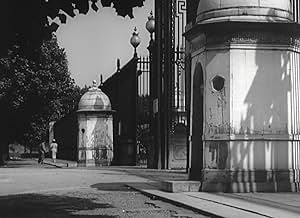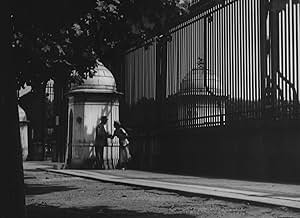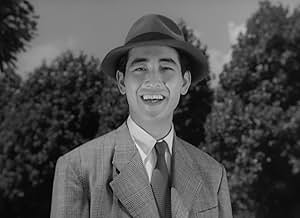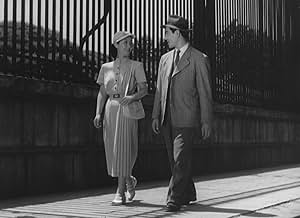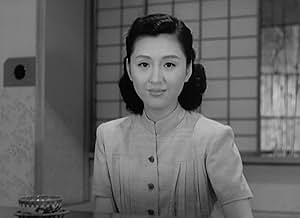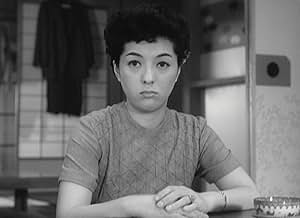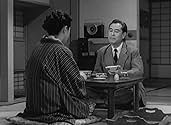PUNTUACIÓN EN IMDb
7,6/10
4,1 mil
TU PUNTUACIÓN
Un matrimonio sin hijos se enfrenta a una crisis.Un matrimonio sin hijos se enfrenta a una crisis.Un matrimonio sin hijos se enfrenta a una crisis.
- Dirección
- Guión
- Reparto principal
- Premios
- 1 premio en total
Reseñas destacadas
Japanese master Yasujiro Ozu made this 1952 film between two masterpieces, Early Summer and (especially) Tokyo Story, and this film suffers a bit by comparison with them. As in other (somewhat more accomplished) movies by Ozu (one thinks especially of the superb Late Spring) the plot deals on the issue of whether a young woman should marry, and if that marriage should be a love marriage or arranged one. There is a middle aged, childless couple, the snobbish, nasty Taeko (Michiyo Kogure) and her husband, the honest, good but a bit dull salary man Satake (Shin Saburi). Her nephew, the pretty young Setsuko (Keiko Tsushima) comes to visit, she has to go to an interview for an arranged marriage, but seeing the loveless marriage between Taeko and Satake, and how she mocks him behind his back, is not very interested.
Ozu's best films haven't dated a bit, but this one has somewhat. Moreover, while I don't agree with the generalization that all of Ozu's films are slow (not all of them are), this one is on the leisurely paced side. What's more, the movie takes some time to develop its plot so it does require a bit of patience from the viewer. You will eventually warm up to this movie, I think, but not immediately.
On the plus side, it is a good, interesting movie, with believable, well developed characters. Chishu Ryu, Chikage Awashima and Kumiko Mikaye (all regular of many Ozu films) have bit roles here.
Ozu's best films haven't dated a bit, but this one has somewhat. Moreover, while I don't agree with the generalization that all of Ozu's films are slow (not all of them are), this one is on the leisurely paced side. What's more, the movie takes some time to develop its plot so it does require a bit of patience from the viewer. You will eventually warm up to this movie, I think, but not immediately.
On the plus side, it is a good, interesting movie, with believable, well developed characters. Chishu Ryu, Chikage Awashima and Kumiko Mikaye (all regular of many Ozu films) have bit roles here.
The Flavour of Green Tea over Rice (Ochazuke no aji) is an Ozu film; a subdued drama analyzing the transformation of Japan post-WWII in small, personal ways. This film follows a childless married couple as they navigate changing traditions, conceptions of marriage, and love. The relationship between the two is strained - the husband is a simple country man who enjoys his country cigarettes, riding in the third class passenger car of trains, and throwing himself into his work with tact and politeness. The wife is a city girl, enjoying spa days, expensive and luxurious decorations, and first class train rides. These two struggle to relate to each other, in a marriage that was set up over a decade ago as an arranged marriage.
The catalyst to this film is when their headstrong niece comes to stay. A product of the new Japan, she is not interested in an arranged marriage, and instead wants to meet someone through dating, and marry for love, not familial status. This is scandalous to both her parents and our married couple. However, the two begin to see each other in a new light, engaging with new ideas, trying new things, and ultimately coming together in a touching and mute scene of culinary exploration and intimacy.
Ozu has a way with scenes. Each scene is meticulously detailed, and dripping with meaning, while maintaining a muted, quite feel. Ozu is, of course, a master of film making of this era, and this film is no different. It poignantly portrays the changing nature of relationships, love and marriage in Japan with subtlety, grace, and beauty. There are many wonderful scenes and shots in this film, and it is an Ozu film worth watching.
Complaints-wise, this film feels much slower then many of Ozu's films, almost to the point of not really moving. This seems to be a stylistic choice that compliments the thesis of the film, but also makes the film a bit distractable at times. Scenes feel like they jump at times, and the chronology of events, while supposed to be clear, is often not, for brief moments.
A wonderful film in many ways that just, barely, lacks the Ozu charm and perfection that is common in films like Tokyo Story, for example. Even so, this is a lovely, sweet and touching film that is easily watchable, and contains many of the charms of Ozu's work. Easy recommendation for fans of Ozu, or fans of quite, small and beautiful stories and dramas.
The catalyst to this film is when their headstrong niece comes to stay. A product of the new Japan, she is not interested in an arranged marriage, and instead wants to meet someone through dating, and marry for love, not familial status. This is scandalous to both her parents and our married couple. However, the two begin to see each other in a new light, engaging with new ideas, trying new things, and ultimately coming together in a touching and mute scene of culinary exploration and intimacy.
Ozu has a way with scenes. Each scene is meticulously detailed, and dripping with meaning, while maintaining a muted, quite feel. Ozu is, of course, a master of film making of this era, and this film is no different. It poignantly portrays the changing nature of relationships, love and marriage in Japan with subtlety, grace, and beauty. There are many wonderful scenes and shots in this film, and it is an Ozu film worth watching.
Complaints-wise, this film feels much slower then many of Ozu's films, almost to the point of not really moving. This seems to be a stylistic choice that compliments the thesis of the film, but also makes the film a bit distractable at times. Scenes feel like they jump at times, and the chronology of events, while supposed to be clear, is often not, for brief moments.
A wonderful film in many ways that just, barely, lacks the Ozu charm and perfection that is common in films like Tokyo Story, for example. Even so, this is a lovely, sweet and touching film that is easily watchable, and contains many of the charms of Ozu's work. Easy recommendation for fans of Ozu, or fans of quite, small and beautiful stories and dramas.
Ozu marriage stories are one of the best ones. He really hits you with his deep and truthful dialogues. I loved the cinematography and the use of shadows. Also, I got hungry watching this.
Its about a rich family and arranged marriages. Taeko is in an arranged marriage which is not so successful, they communicate very badly and she lies to get out and do fun things with her friends. For her it is easy to lie to the husband as she thinks he is very stupid. Her niece don't want to go on a arranged marriage meet, but decide for herself who she wants to marry probably a sign of the times, the transition from traditional to modern Japan. In other ways also the modern is juxtaposed with the traditional, they wear kimonos as naturally as western style clothes. And her sister is working in a top position as a designer.
As another IMDb reviewer said this is most interesting because of the charming characters. The elegant, but a bit arrogant and selfish Satake Taeko (Kogure Michiyô) had me spellbound from beginning to end. All characters are interesting and the interaction and communication between them make up the movie.
The city itself takes up a small role in the movie as well, something I like a lot. Editing also is very clever at times. Its never ordinary or dull.
As another IMDb reviewer said this is most interesting because of the charming characters. The elegant, but a bit arrogant and selfish Satake Taeko (Kogure Michiyô) had me spellbound from beginning to end. All characters are interesting and the interaction and communication between them make up the movie.
The city itself takes up a small role in the movie as well, something I like a lot. Editing also is very clever at times. Its never ordinary or dull.
"The flavour of green tea over rice" is both a typical Ozu movie and one that defiates from his usual format in some respects.
Typical Ozu is the emphasis on small- and not on big emotions. The story is, as usual. Situated in the post World War II era, and the influence of the United States on the Japanese society is clearly visiblle (baseball match).
In most of the Ozu films the central relations are between children and parents (at the beginning of his career) or between parents and grandparents (later in his career). In "The flavour of green tea over rice" it is a married couple that forms the center of the film. Their marriage was arranged and is not in good shape. You can feel it when the man returns home from his work and the greeting of the two spouses is lukewarm at best.
The woman seems independent and emancipated at first. She has her female friends and she likes going out with them. As the film progresses she becomes however less and less sympathetic. In front of her female friends she expresses herself very disrespectfully about her husband (a dummy), whom we get to know as a person of great integrity. She happens to be of richer descent than her husband and dislikes his "cheap taste" (maybe being a snob herself).
Although differences between genarations do play a lesser role than in most Ozu films, they aren't totally non existent either. Seeing the marriage between her uncle and aunt, a niece of the woman in a subplot vehemtly resists becoming trapped in an arranged marriage herself.
In one of the most beautiful happy ends I have ever seen the two spouses reconcile with each other. When the man arrives at home in the middle of the night from the airport the servants are already in bed. Man and woman together prepare a meal, in so doing discovering how their kitchen works (normally the woman never cooks herself). The act of preparing a meal is capable to bridge the gap that hitherto existed between man and woman, just like the act of eating a (delicious) meal is capable of bridiging tge gap between Protestants and Roman Catholics in "Babette's feast" (1987, Gabriel Axel). The meal in "The flavour of green tea over rice" is however very simple compared with "Babette's feast". It's not the food itself that does the trick, it is all about the small talk during the preparation. Ozu as the master of the small emotions at his very best.
Typical Ozu is the emphasis on small- and not on big emotions. The story is, as usual. Situated in the post World War II era, and the influence of the United States on the Japanese society is clearly visiblle (baseball match).
In most of the Ozu films the central relations are between children and parents (at the beginning of his career) or between parents and grandparents (later in his career). In "The flavour of green tea over rice" it is a married couple that forms the center of the film. Their marriage was arranged and is not in good shape. You can feel it when the man returns home from his work and the greeting of the two spouses is lukewarm at best.
The woman seems independent and emancipated at first. She has her female friends and she likes going out with them. As the film progresses she becomes however less and less sympathetic. In front of her female friends she expresses herself very disrespectfully about her husband (a dummy), whom we get to know as a person of great integrity. She happens to be of richer descent than her husband and dislikes his "cheap taste" (maybe being a snob herself).
Although differences between genarations do play a lesser role than in most Ozu films, they aren't totally non existent either. Seeing the marriage between her uncle and aunt, a niece of the woman in a subplot vehemtly resists becoming trapped in an arranged marriage herself.
In one of the most beautiful happy ends I have ever seen the two spouses reconcile with each other. When the man arrives at home in the middle of the night from the airport the servants are already in bed. Man and woman together prepare a meal, in so doing discovering how their kitchen works (normally the woman never cooks herself). The act of preparing a meal is capable to bridge the gap that hitherto existed between man and woman, just like the act of eating a (delicious) meal is capable of bridiging tge gap between Protestants and Roman Catholics in "Babette's feast" (1987, Gabriel Axel). The meal in "The flavour of green tea over rice" is however very simple compared with "Babette's feast". It's not the food itself that does the trick, it is all about the small talk during the preparation. Ozu as the master of the small emotions at his very best.
¿Sabías que...?
- CuriosidadesAt the start of the film, two characters mention going to see a new film with Jean Marais. The film was most likely Orfeo (1950), which was released in Japan in June 1951.
- Citas
Taeko Satake: Think well before you pick your groom, it's important.
- ConexionesFeatured in David Bordwell on 'The Flavor of Green Tea Over Rice' (2019)
- Banda sonoraLove's Old Sweet Song
Composed by J.L. Molloy (as James Lyman Molloy)
Selecciones populares
Inicia sesión para calificar y añadir a tu lista para recibir recomendaciones personalizadas
- How long is The Flavor of Green Tea Over Rice?Con tecnología de Alexa
Detalles
- Duración
- 1h 56min(116 min)
- Color
- Mezcla de sonido
- Relación de aspecto
- 1.37 : 1
Contribuir a esta página
Sugerir un cambio o añadir el contenido que falta

